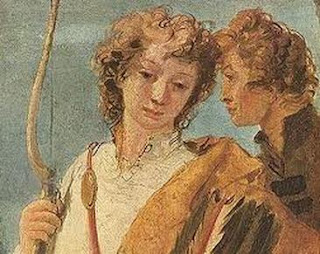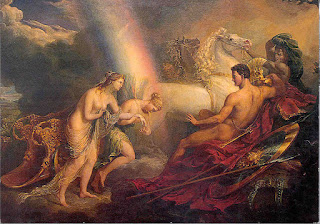1. extension of quiz and orientation
a. Penelope's weaving
In Homer's
Odyssey,
Penelope is the faithful wife of Odysseus, who keeps her suitors at bay in his long absence and is eventually reunited with him.
Her name has traditionally
been associated with marital faithfulness, and so it was with the Greeks and Romans, but some recent feminist readings offer a more ambiguous interpretation.
On
Odysseus's return,
disguised as an old beggar, he finds that Penelope
has remained faithful. She has devised tricks to delay her suitors, one
of which is to
pretend to be weaving a burial shroud for Odysseus's
elderly father Laertes
and claiming that she will choose a suitor when she has finished. Every
night for three years, she undoes part of the shroud, until Melantho, one of twelve unfaithful serving women, discovers her chicanery and reveals it to the suitors.
b.
Telemachus
Telemachus is a figure in Greek mythology,
the son of Odysseus and Penelope, and a central character in Homer's
Odyssey. The first four books of the
Odyssey focus on
Telemachus' journeys in search of news about his father, who has yet to return home from the Trojan War, and are traditionally given the title the
Telemachy.
c.
Argos
In Homer's
Odyssey,
Argos is Odysseus' faithful and old dog.
d.
Siren
In Greek mythology,
the Sirens were dangerous yet beautiful creatures, who lured nearby sailors with
their
enchanting music and voices to shipwreck on the rocky coast of
their island. Odysseus, advised by Circe,
plugged the crew's ears with wax and ordered them to bind him on the
mast of the ship. He also told them that no matter how much he begged,
they should not untie him. When they passed near the Sirens' island, Odysseus started begging his shipmates to let him go, but none heard him; instead, they tied him even more. After they passed, Odysseus let them know that they were now in safe waters.
e. Lotus
In Greek mythology the
lotus-eaters, also referred to as the
lotophagi or
lotophaguses or
lotophages, were a race of people living on an island dominated by lotus plants. The lotus fruits and flowers were the primary food of the island and were narcotic,
causing the people to sleep in peaceful apathy.
In the Odyssey IX, Odysseus tells how adverse north winds blew him and his men off course as they were rounding Cape Malea, the southernmost tip of the Peloponnesus, headed westwards for Ithaca. And the right side of the picture was illustrated that
Odysseus removing his men from the company of the lotus-eaters.
f.
Cassandra (prophetess)
Cassandra was the daughter of King Priam and Queen Hecuba of Troy.
A common version of her story is that Apollo gave her the power of prophecy
in order to seduce her, but when she refused,
he spat into her mouth
cursing her never to be believed. In an alternative version, she fell
asleep in a temple, and snakes licked (or whispered in) her ears so that
she was able to hear the future. Snakes as a source of knowledge is a
recurring theme in Greek mythology, although sometimes the snake brings
understanding of the language of animals rather than an ability to know
the future. Cassandra is a figure of epic tradition and of tragedy.
2.Other stories
a. Argos →
mission
On November 4, 1979, Iranian activists storm the United States embassy in Tehran in retaliation for President Jimmy Carter giving the Shah asylum in the U.S. during the Iranian Revolution.
More than 50 of the embassy staff are taken as hostages, but six avoid capture and hide in the home of Canadian ambassador Ken Taylor. With the escapees' situation kept secret, the U.S. State Department begins to explore options for exfiltrating them from Iran. Tony Mendez, a U.S. Central Intelligence Agency
exfiltration specialist, is brought in for consultation. He criticizes
the proposals, but is at a loss when asked for an alternative. While on
the phone with his son, he is inspired by watching
Battle for the Planet of the Apes
and begins plans for creating a cover story for the escapees: that they
are Canadian filmmakers who happened to be in Iran scouting exotic
locations for a similar science-fiction film.
c.
Zeus, Io, Hera
Argus was Hera's servant. His great service to the Olympian pantheon was to slay the chthonic serpent-legged monster Echidna as she slept in her cave.
Hera's defining task for Argus was to guard the white heifer Io from Zeus, keeping her chained to the sacred olive tree at the Argive Heraion. She charged him to "Tether this cow safely to an olive-tree at Nemea". Hera knew that the heifer was in reality Io, one of the many nymphs Zeus was coupling with to establish a new order.
To free Io, Zeus had Argus slain by Hermes.
The messenger of the Olympian gods, disguised as a shepherd, first put
all of Argus' eyes asleep with spoken charms, then slew him by hitting
him with a stone, the first stain of bloodshed among the new generation
of gods.
The sacrifice of Argus liberated Io and allowed her to wander the earth, although tormented by a gadfly sent by Hera.
According to Ovid, to commemorate her faithful watchman,
Hera had the hundred eyes of Argus preserved forever, in a peacock's tail.
d. lotus →
temptation
In the movie Percy Jackson , three main characters go to the Lotus Hotel and Casino. While inside it, it seems like time never passes and nobody wants to leave. It was created by the Lotus-eaters so that anyone entering would never
want to leave because of all the addictive games, food (in the case of
the movie), and other activities, combined with the unlimited money on
plastic cards. The hotel causes those inside never to age, while time
goes on at a seemingly accelerated rate outside.
In the movie, the cause of staying is
eating "Lotus Flowers" while in the book, they stay there because of the
games.




































